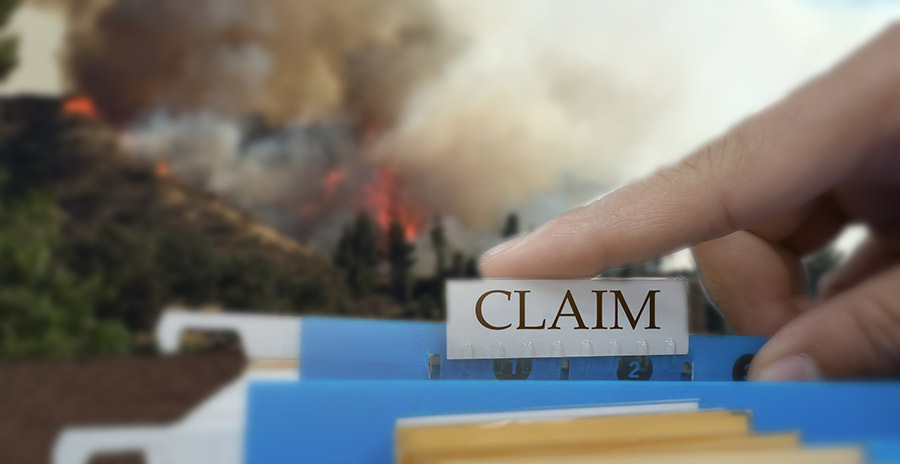In 2020 alone, California experienced nearly 10,000 fires that destroyed over 4.2 million acres and thousands of houses. If you live in a fire-prone part of the Golden State, you must know how to file fire insurance claims for lost personal property.
The typical homeowner’s insurance policy covers fire and smoke damage. However, your insurer may not compensate you for smoke damage unless you insist on it. Here’s what you should know about filing fire, smoke, and soot damage insurance claims and pursuing adequate compensation from insurance companies.
How To Know If You Have A Claim

Fire damage to your home and personal property is hard to miss, but smoke and soot damage may be invisible to the untrained eye and take time to manifest. Smoke and soot damage is usually most apparent in HVAC systems, attic insulation, air ducts, walls, furniture, roofs, driveways, and clothing.
If a wildfire recently passed through your area and your house is still standing, you probably have smoke damage. Check the coverage limit of your insurance policy to verify that you have smoke coverage. If you do, have your premises professionally inspected for flame, ash, and smoke damage.
The property damage report after the inspection will enable you to file an insurance claim that covers not only complete or partially burned property, but also damages caused to your property by smoke, soot, or ash. After receiving your claim, your insurer will send an adjuster to assess the damage to your property. If the adjuster’s assessment doesn’t match your property damage report, inform your insurer.
If your insurer won’t accept that their adjuster overlooked smoke or soot damage to your property, it’s time to contact a lawyer. Our California wildfire lawyers will ensure that your insurer hears your voice and will help you seek compensation for your property damage.
How to File Fire Insurance Claims for Smoke, Soot, and Ash Damage to Your Property
1. Document Property Damage
For smoke damage to your appliances or furniture, contact a repairer to start a paper trail that will support your claim. If the fire caused visible damage to your property, take pictures.
2. File A Claim With Your Home Insurance
Upon filing a fire damage claim, your insurance company will want to see any proof of the damages. They’ll also send out their own adjuster to survey the damages and make a determination of how much and when your claim may get paid out.
3. Cooperate With Your Insurer’s Adjuster
You can research an adjuster after they’ve inspected your property. If your research reveals that the adjuster is untrustworthy or unqualified, you can ask your insurer to send a different adjuster or hire one yourself.
4. Receive Your Insurer’s Offer
If you are uncertain about accepting an offer from your insurer, contact our California smoke damage lawyer. We will do the necessary research to determine whether the offer is adequate. If the offer is low, we will guide you toward legal options to strengthen your case and attempt to increase your insurer’s offer.
How to Handle a Denied Claim for Smoke Damage
If your insurer denies your claim for smoke damage, look at the reason stated in the denial letter. The reason may be:
- Late filing of a claim
- A missed premium payment
- False statements in your claim
- Insufficient damage documentation
- Lack of coverage for the stated damage
If the denial is due to a mistake you made, we can help rectify it and resubmit your claim. Should the denial be due to your insurer disagreeing with the value of your claim, we can hire a private adjuster to reexamine the damage.
What if the insurer still refuses to accept your claim? We will initiate legal proceedings to attempt to compel the insurance company to settle your claim within the coverage limits of your policy.
Contact Wildfire Insurance Attorney To Seek Helps Getting Maximum Compensation

Now that you know how to file fire insurance claims, you might be considering handling your claim yourself. However, note that without a wildfire lawyer, your insurer may try to:
- Undervalue your property damage.
- Claim that your policy does not cover the damage.
- Exploit loopholes in your policy.
- Delay your compensation.
- Give a misleading report.
A California wildfire lawyer from Era Law, Inc., can help you avoid such issues and build a case to seek maximum compensation. Contact us today to schedule a free case evaluation.
